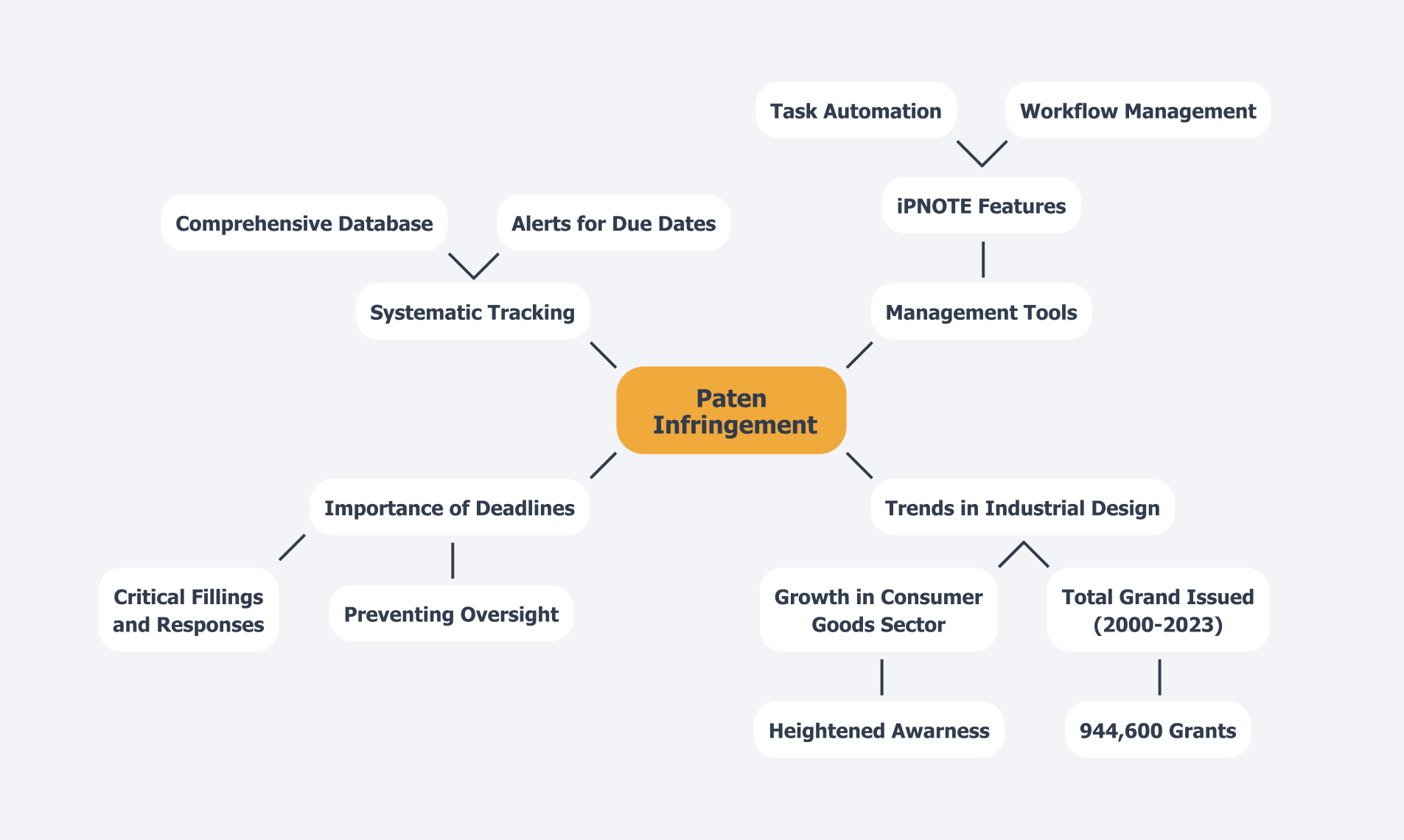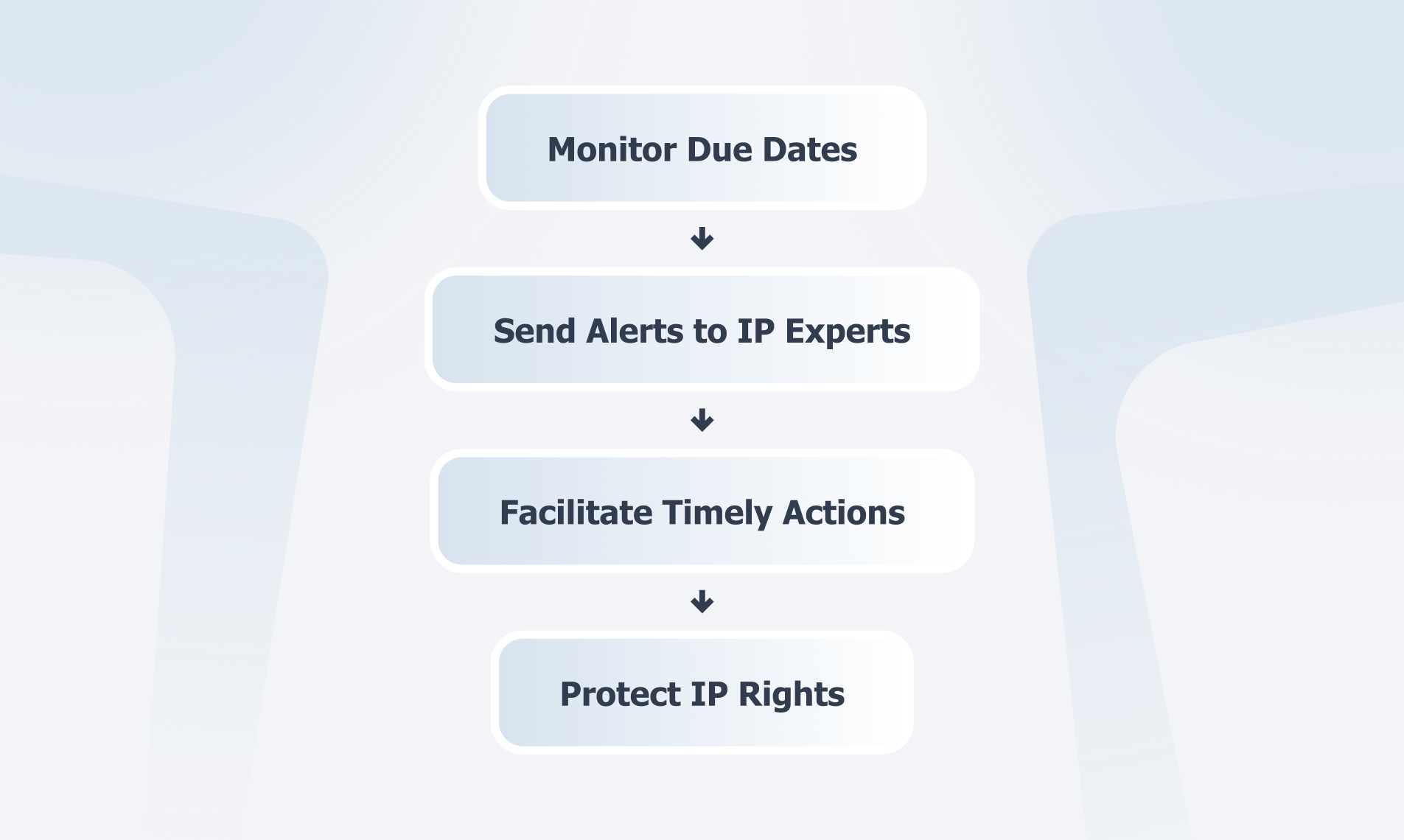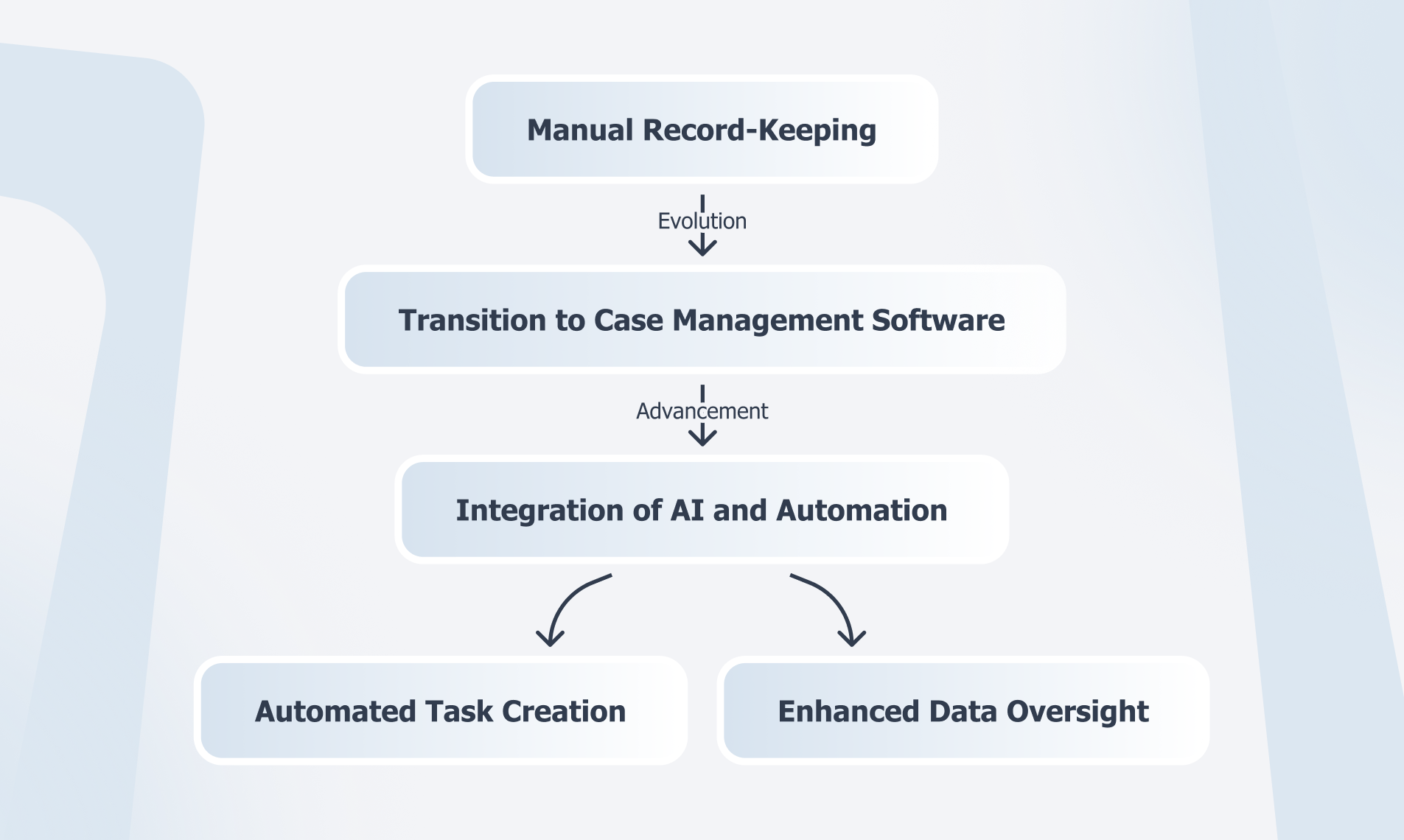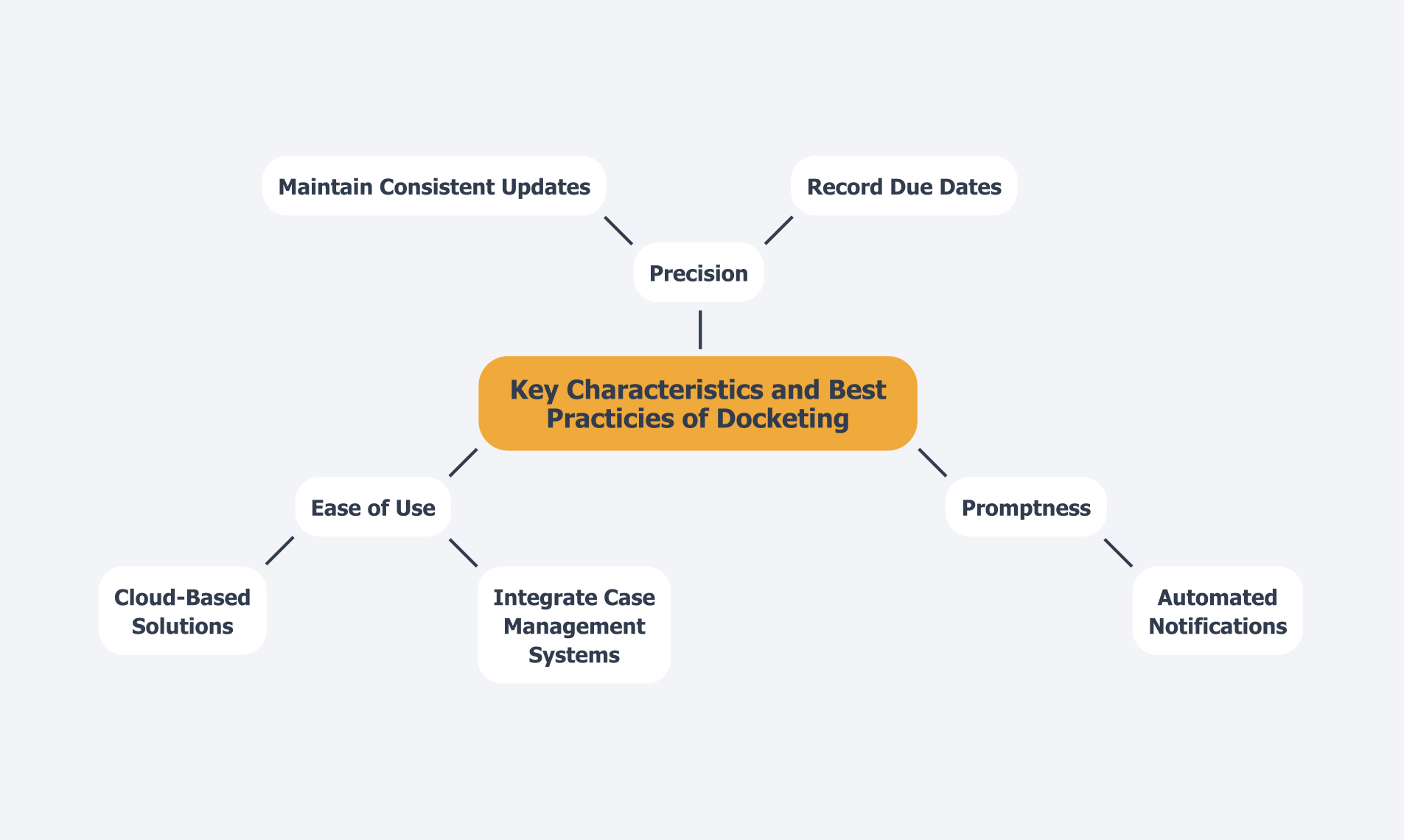Overview
Docketing in intellectual property management represents the systematic tracking and management of critical deadlines and documents pertinent to IP matters. This process is essential for safeguarding rights against the risks posed by missed deadlines.
Why is effective docketing so crucial?
- It enhances operational efficiency.
- It supports compliance with legal standards.
- It ultimately fosters innovation and economic growth through robust management frameworks.
By implementing effective docketing practices, organizations not only protect their intellectual property but also position themselves for sustainable success in a competitive landscape.
Introduction
In the intricate realm of intellectual property management, docketing stands as a cornerstone for safeguarding valuable rights. This systematic approach not only tracks critical deadlines but also enhances operational efficiency, empowering organizations to navigate the complexities of IP laws with confidence.
As the global landscape of patents, trademarks, and copyrights grows increasingly competitive, the significance of robust docketing practices cannot be overstated. With advancements in technology, particularly AI-driven platforms like iPNOTE, businesses are now equipped to automate and streamline their docketing processes, significantly reducing the risk of costly oversights.
This article delves into the evolution, importance, and best practices of docketing, illustrating how effective management can drive innovation and protect intellectual property in a rapidly changing environment.
Define Docketing in Intellectual Property Management
The docketing meaning in intellectual property oversight represents a systematic approach to tracking and managing critical deadlines, statuses, and documents associated with various IP matters, including patents, trademarks, and copyrights. This essential process involves maintaining a comprehensive database that alerts IP professionals to crucial due dates, thereby preventing the oversight of significant filings or responses. With iPNOTE’s advanced task management features, corporate IP managers can automate task creation and reminders, ensuring efficient workflow management and complete transparency in their operations.
The significance of efficient record-keeping is underscored by the issuance of over 944,600 industrial design grants globally from 2000 to 2023, highlighting a growing recognition of the importance of protecting design elements in products. A longitudinal study on industrial design applications has shown a notable increase, particularly in the consumer goods sector, reflecting heightened awareness among companies about the necessity of safeguarding their innovations. Furthermore, the 2023 International Intellectual Property Index emphasizes key industry sectors, such as technology and consumer products, which exhibit the highest number of international industrial design applications, illustrating the competitive landscape where effective management is paramount.
By ensuring compliance with legal standards and protecting intellectual property rights, robust management frameworks—such as those offered by iPNOTE—are vital for fostering innovation and driving economic growth, all while managing costs efficiently through fixed-term agreements.

Contextualize Docketing: Importance in IP Management
The docketing meaning refers to the organized monitoring of due dates and significant moments in intellectual property management, which is crucial for protecting valuable rights. It significantly reduces the risk of losing these rights due to overlooked timings or administrative errors.
An effective scheduling system alerts IP experts to upcoming due dates, facilitating timely actions essential for rights preservation. For example, failing to renew a trademark on time can lead to the forfeiture of those rights, underscoring the necessity for organizations to implement robust tracking methods. The stakes are high; data indicates that in 2025, neglecting deadlines in patent applications could lead to abandonment, jeopardizing IP rights and potentially impacting revenue. The importance of meticulous record-keeping is further amplified by the increasing complexity of IP laws and regulations. A well-structured scheduling system not only enhances operational efficiency but also supports strategic decision-making, enabling businesses to navigate the intricate landscape of intellectual property oversight effectively.
Practical examples illustrate the risks associated with missed timelines. Numerous businesses lack a clear, proactive IP strategy, resulting in underutilized patents and lost monetization opportunities. For instance, a case study from the USA revealed a 7x return on investment in the number of deals through effective marketing strategies and clear positioning. Another example from Bulgaria demonstrated how a firm with fewer than 10 employees secured two major clients in a competitive market by developing a robust IP strategy. These cases reinforce the critical importance of effective docketing meaning in IP management. Moreover, iPNOTE’s Prime Ultra plan provides a comprehensive solution that ensures a 3x increase in customer acquisition through tailored marketing strategies and enhanced profiles. This plan not only reduces commission costs but also offers personalized support, enabling clients to manage their IP portfolios effectively. Testimonials from satisfied users, including UAB METIDA and NEREO LEGAL, highlight how iPNOTE’s platform streamlines the IP management process, ensuring timely task fulfillment and rights protection. It’s essential to recognize that trademark renewal costs vary by jurisdiction, adding another layer of risk associated with missed deadlines. For instance, Max Walters noted that the UK is the only jurisdiction where a document has been submitted after the deadline, emphasizing the potential repercussions of inadequate record-keeping practices.

Trace the Origins and Evolution of Docketing
The evolution of record-keeping in intellectual property management has been marked by significant advancements. Initially, scheduling relied heavily on manual methods, utilizing paper documents and physical calendars to monitor important due dates. As the legal landscape grew more complex, the demand for efficient tracking systems, which relate to docketing meaning, spurred the development of specialized case management software. This transition not only optimized operations but also minimized human errors, enhancing overall data oversight.
Historically, effective record-keeping has been crucial for ensuring compliance with various legal deadlines, which have become increasingly intricate due to the rise of global IP administration. The integration of cutting-edge technologies, such as artificial intelligence and automation, has transformed the docketing meaning in practices. iPNOTE exemplifies this transformation with its comprehensive AI-driven IP oversight platform, offering advanced task and provider coordination features, including automated task creation and swift access to your IP portfolio.
These innovations have redefined the process into a highly efficient framework that prioritizes accuracy and reliability. For instance, automated scheduling solutions can promptly refresh deadlines and alert users to upcoming tasks, significantly reducing the risk of oversight while also lowering IP oversight costs through access to a diverse range of international providers and fixed-term agreements, ensuring full transparency.
Statistics indicate that firms utilizing automated scheduling tools experience a marked reduction in administrative burdens, with some reports suggesting a decrease of up to 30% in time spent on manual tracking. This efficiency allows legal professionals to devote more time to strategic decision-making. Furthermore, expert opinions emphasize the necessity of embracing these technologies to maintain competitiveness in a rapidly evolving environment. Industry leaders assert that companies failing to innovate in their processes risk falling behind their competitors.
Additionally, case studies, such as the one on ‘Innovation and Nonproprietary Approaches,’ illustrate the tangible effects of process evolution, highlighting how organizations that adopt open frameworks can foster creativity and innovation in their IP strategies. As the landscape continues to evolve, effective organization will become increasingly essential in IP management, driving the need for ongoing innovation and adaptation, particularly through streamlined IP portfolio reporting and risk management facilitated by platforms like iPNOTE.

Identify Key Characteristics and Best Practices of Docketing
An efficient scheduling framework is characterized by precision, promptness, and ease of use. To achieve optimal methods for effective scheduling, it is essential to:
- Maintain consistent updates to the scheduling database
- Diligently record all due dates
- Establish automated notifications to keep relevant parties informed of impending deadlines
Integrating case management systems with other IP management tools cultivates a seamless workflow, significantly enhancing overall efficiency. For instance, cloud-based scheduling solutions facilitate real-time updates and collaboration among team members, ensuring that all stakeholders remain informed and aligned on critical deadlines.
This integration is particularly crucial in the context of the rapidly evolving legal landscape, where the Asia Pacific region is poised to experience the highest growth in the docketing software market, which emphasizes the docketing meaning driven by digital transformation and increasing legal activities. Given the intense competitive rivalry in the legal calendaring software market, it is vital to address challenges such as data security and high costs to expand the adoption of these systems, particularly in developing regions.
As highlighted in the case study “Challenges in the Docketing Software Market,” overcoming these obstacles is essential for increasing market penetration. Furthermore, as Elon Musk stated, “Tesla will not initiate patent lawsuits against anyone who, in good faith, wants to use our technology,” underscoring the importance of innovation and collaboration within the IP landscape.

Conclusion
Docketing stands as a crucial instrument in the management of intellectual property, ensuring that essential deadlines and compliance requirements are adhered to for the protection of valuable rights. The systematic tracking of IP-related matters not only averts costly oversights but also promotes operational efficiency, empowering organizations to navigate the intricacies of IP laws with assurance. The emergence of advanced technologies, particularly AI-driven platforms like iPNOTE, has transformed the docketing process, facilitating automation that significantly alleviates administrative burdens and enhances precision.
The implications of effective docketing are profound. With the risk of substantial financial consequences arising from missed deadlines, organizations must prioritize robust docketing practices. Real-world instances exemplify the influence of diligent IP management strategies, illustrating how effective docketing can result in increased customer acquisition and overall business prosperity. Furthermore, the transition of docketing from manual methods to advanced software solutions underscores the essential need for ongoing adaptation in a swiftly evolving landscape.
In summary, the adoption of best practices in docketing is vital for any organization aiming to safeguard its intellectual property effectively. By ensuring accurate record-keeping, employing automated alerts, and integrating docketing systems with other management tools, businesses can bolster their operational efficiency and protect their innovations. As the competitive landscape continues to shift, embracing advanced docketing solutions will be pivotal in fostering innovation and securing long-term success in the domain of intellectual property management.
Transform Your IP Management with Smart Docketing. Start now with iPNOTE to automate and protect your valuable intellectual property effortlessly.
Frequently Asked Questions
What does docketing mean in the context of intellectual property oversight?
Docketing in intellectual property oversight refers to a systematic approach for tracking and managing critical deadlines, statuses, and documents related to various IP matters, including patents, trademarks, and copyrights.
Why is docketing important for IP professionals?
Docketing is essential because it helps maintain a comprehensive database that alerts IP professionals to crucial due dates, preventing the oversight of significant filings or responses.
How does iPNOTE assist corporate IP managers in managing tasks?
iPNOTE provides advanced task management features that allow corporate IP managers to automate task creation and reminders, ensuring efficient workflow management and complete transparency in their operations.
What does the issuance of over 944,600 industrial design grants indicate?
The issuance of over 944,600 industrial design grants from 2000 to 2023 indicates a growing recognition of the importance of protecting design elements in products.
What trends have been observed in industrial design applications?
A longitudinal study has shown a notable increase in industrial design applications, particularly in the consumer goods sector, reflecting heightened awareness among companies about the necessity of safeguarding their innovations.
Which industry sectors exhibit the highest number of international industrial design applications?
The 2023 International Intellectual Property Index highlights key industry sectors such as technology and consumer products as having the highest number of international industrial design applications.
How do robust management frameworks contribute to innovation and economic growth?
Robust management frameworks, like those offered by iPNOTE, ensure compliance with legal standards and protect intellectual property rights, which are vital for fostering innovation and driving economic growth while managing costs efficiently through fixed-term agreements.






